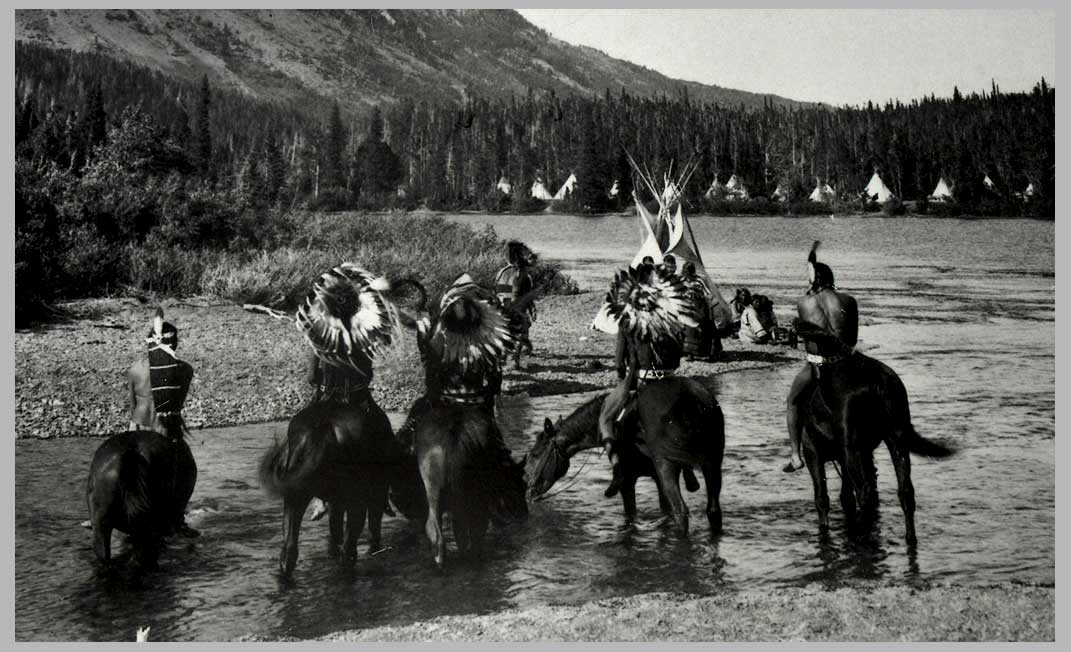
HISTORICAL PHOTOGRAPH—Band of Blackfeet in the lower Two Medicine area,
c. 1914 . . . On the road in the American Northwest.

HISTORICAL PHOTOGRAPH—Band of Blackfeet in the lower Two Medicine area,
c. 1914 . . . On the road in the American Northwest.
The Presence of the Past . . .
As I see it, everything that happens leaves a trace. One may
think of this as a kind of echo, a kind of subtle afterglow of sound
which resonates out of the past to in certain ways further shape
and condition the present. Some echoes are pleasant and good.
While some echoes are bad, reverberating as harsh dissonances.
And of these dissonances, some may be particularly strident, so
much so that we may become caught up in a kind of grinding
repetitive loop until they are resolved.
Personally, as I travel the Northwest, passing through many
so-called reservations, I am frequently overwhelmed by these
still-echoing dissonances of the past. For certainly the tragic
500-year history of the European ruthless conquest of the native
populations of North and South America is not just a matter for
dust-covered school books: In Montana country, it is right there
in front of you, right there walking down the street.
Coming down from the East side of Logan Pass at night after
lingering a bit too long making photographs, I had a surreal
descent. No cars, no lights. The whole road to myself. I just had
my headlamp on, with its batteries running low. About halfway
down, I almost ran into a solitary young wolf in the middle of the
road. It was as surprised to see me as I was to see it. In the weak
light of my headlamp, the wolf looked almost entirely silver.
Ghostly almost.
It let me pass, and that was that. But the next morning, after
I broke camp, I happened upon this historical photo, a part of
which I've reproduced above. It was part of a larger informative
display created by the Park service, and placed on the eastern
edge of Lake Saint Mary. I was first taken aback by the quality
of the image. Then by the date, around 1914 the display said.
Then by the beauty of the image. Not just the composition, but
by the robust health and integrity of all pictured: men, women,
children, horses, culture.
And then the sadness came. For what was lost. But also for
that strange word used above: ruthless, or an extreme form of
violence that is utterly lacking in compassion (ruth: a feeling of pity,
distress or grief).
For the genocide perpetrated by the European upon the Native
American was just that:—ruthless. And what is worse, it was
sanctioned by not just the European's religion, but also by his laws.
(This disingenuous use of the rule of law to subvert the rule of law is,
in my view, one of the most serious, still-ongoing sins of public life.)
Montana is, in my opinion, in a severely self-limiting way, broken apart
by the presence of these open wounds and injustices of the past, which,
much like an abandoned mine, continue to discharge their poison into
the streams of both present and future. And it seems to me that no one
wishes to look straight into the heart of the problem as the silver wolf
looked at me, seeing some strange and foreign presence on a bicycle
at night, but somehow showing no fear.
Given a full tank of petrol and enough money, it's easily possible
to speed down Highway 2, and, hopping from happy reservation
casino to casino, remain oblivious to what I am calling this dissonant
echo of the past. But it is hard for me to see this gambler's view-of-the-world
as anything more than a fin de siècle illusion or deadly trap. If one were
instead to stop and get out of the speeding car and simply walk the
lands of the contemporary Native American, a new beginning might
be possible. The dissonance will be resolved regardless. But pondering
the meaning of the little-used word, ruth, or pity, or compassion, or
the lack there of, may be a good place to start.
| see also the recent related miniature Names as the first Poetry of Place |
NEW: To view / purchase different sized prints of this image at the
PhotoWeek Store click here. view as SLIDESHOW |
[http://www.shutterfly.com/pro/cliffcards/photoweek]